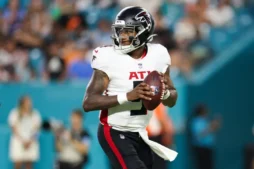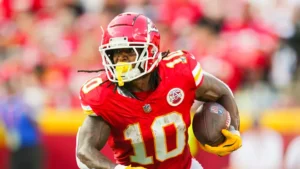How Running Back Situations Can Ruin Your Fantasy Football Playoff Run
As we head into the fantasy football playoffs, it’s crucial to navigate some tricky running back situations that could make or break your championship hopes. With the ever-shifting backfields and injury concerns, finding consistency at the running back position can be a nightmare. Let’s break down a few key running back situations that could torpedo your fantasy playoff run, drawing from the latest trends in the league.
1.Isaac Guerendo and the San Francisco 49ers’ Backfield Drama
Isaac Guerendo, now poised to be the starting running back for the San Francisco 49ers, is the top waiver wire priority for many fantasy managers, especially those fighting for a playoff spot. After the injury to Christian McCaffrey, Guerendo’s value skyrocketed. However, there are major red flags here.
The 49ers offense has been sputtering lately, and with a tough upcoming schedule (including matchups against high-scoring teams like Miami and Detroit), the 49ers could be forced into a lot of pass-heavy game scripts. This doesn’t bode well for Guarendo’s rushing upside. However, if he can stay healthy and maintain a consistent role in the passing game, he could offer some PPR value, particularly as a receiving back.
Still, if you’re relying on Guarendo for your playoff push, it’s a risky bet. The 49ers have been inconsistent, and the loss of key players like McCaffrey and Deebo Samuel could make it even harder to sustain offensive drives. Touchdowns could be few and far between, and while Guarendo might see volume, his value is more about the opportunities in the passing game than rushing efficiency.
Takeaway: If you’re on the cusp of the playoffs and in need of depth, you may want to pick him up just to block other contenders. But for a true fantasy winner, his upside seems limited unless the 49ers’ offense turns things around.
2. The Chargers’ Running Back Committee: A Fantasy Headache
Another team with a confusing backfield is the Los Angeles Chargers. After the injury to JK Dobbins, the backfield has been a mess. Gus Edwards had a quiet game despite receiving the majority of snaps, while Hassan Haskins fumbled away his opportunities. Meanwhile, rookie Kimani Vidal saw 23% of snaps, but none of these backs have emerged as a clear top option.
For fantasy managers heading into the playoffs, the Chargers’ situation is a nightmare. If you need a plug-and-play running back in the later weeks, Edwards may be the most reliable option, but he’s more of a touchdown-or-bust player. The Chargers’ offense may not be running the ball enough to give any back significant fantasy relevance, and their tough matchups down the stretch (Tampa Bay, Denver, and New England) don’t inspire confidence in the backfield’s ability to dominate.
Takeaway: If you’re looking to stream running backs during the playoffs, you could do worse than Edwards, but he should not be counted on as a reliable starter. Instead, look for more stable and high-volume backfields elsewhere.
3. Dynasty Dilemma: Trey Benson vs. Jonathan Brooks
Dynasty leagues add another layer of complexity to the running back position, especially when young talents find themselves behind veterans who just signed contract extensions. Trey Benson and Jonathan Brooks are two rookie running backs that have intriguing potential, but their value may be capped by the extensions of James Conner (for Benson) and Chuba Hubbard (for Brooks).
- Trey Benson: Benson, who was once seen as a potential starter, is now buried behind Conner, who just inked a two-year extension. While Conner is getting older, his contract and the Cardinals’ tendency to ride their starting back means Benson’s path to a lead role is unclear. However, Benson could still see valuable touches in a committee situation, and if Conner’s workload decreases, he could become a key contributor next season.
- Jonathan Brooks: The Panthers’ Brooks, on the other hand, faces a similar situation with Chuba Hubbard, who recently signed a four-year deal. The Panthers are likely to use both backs in a split role, similar to how Detroit has used David Montgomery and Jahmyr Gibbs. While Hubbard is likely to see the early-down work, Brooks could carve out a niche as the passing-down back, which could give him value in PPR formats.
Takeaway: If you’re looking for long-term value, Jonathan Brooks seems like the better bet. The Panthers have committed to him, and his involvement in the passing game could give him steady production. In contrast, Benson is stuck behind a durable Conner and could be more of a wait-and-see player.
4. The Impact of Running Back Chaos on Your Playoff Roster
As the fantasy football season progresses and playoff berths are on the line, a shaky backfield situation can quickly become a nightmare. Here’s why:
- Inconsistent Roles: When a running back’s role isn’t secure, it leaves fantasy managers in a lurch. The fear of relying on a player who could get benched for a fumble, suffer a sudden drop in snap share, or simply be part of an unpredictable committee can make it hard to trust them in crucial playoff matchups.
- Injuries: Running back injuries are the most common and impactful, and they can disrupt an entire fantasy roster. Even if a running back steps into a starting role, it’s impossible to predict how effective they’ll be or if they can stay healthy long enough to help you win a championship.
- Game Script and Opponent Matchups: A backfield that’s playing catch-up all game (like Garrido’s potential with the 49ers) means you’re more likely to see them utilized in the passing game than in the running game. If the team is constantly trailing, it limits the running back’s opportunities to score touchdowns or put up meaningful fantasy points.
Final Thoughts: Playoff Preparation and the RB Shuffle
As fantasy owners, it’s important to remain flexible and ready to pivot when dealing with these running back situations. Look for backfields where you can identify the “lead” back, even if it’s a shaky situation (like Gus Edwards with the Chargers). Avoid relying too heavily on unproven backs or those in timeshares unless the matchups are favorable and the back has shown potential.
If you’re lucky enough to have a stable backfield or a high-volume workhorse, then great — you’re one step closer to the championship. But for everyone else, staying on top of waiver wire trends, handcuffs, and injury reports is going to be key in securing your playoff spot and positioning yourself for a run at the title.
Don’t let a messy backfield ruin your fantasy football season. Adapt, adjust, and keep your eyes on the prize. Happy hunting in the playoffs!












